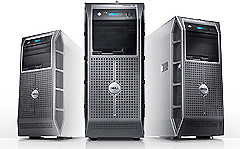Virtualization with VMware
Virtualization
is a technique used to provide a certain kind of
virtual machine environment,
namely, one that is a complete simulation of the underlying hardware. In
such an environment, any software capable of execution on the raw
hardware can be run in the virtual machine and, in particular, any
operating systems.
VMware is a market leader in virtualization solutions, providing a robust
suite of advanced virtualization solutions, from client to server to
storage. Advanced capabilities like VMotion, DRS and SRM enable
organizations to accomplish previously difficult IT operations with much
greater ease.
VMware's advanced server virtualization features rely on the ability to move
virtual machines fluidly between hosts and data centers without
impacting performance. In addition, VMware's advanced desktop
virtualization features rely on the ability to serve up a desktop
remotely while maintaining the user experience. Both of these
fundamental value propositions assume a network that is intelligent,
flexible and powerful enough to support and adapt.
·
Installs like an application, with simple, wizard-driven installation
and virtual machine creation process
·
Includes a web based management interface with a simple, flexible,
secure, intuitive and productive management experience
·
Runs on any standard x86 hardware, including Intel and AMD hardware
virtualization assisted systems
·
Runs on a wider variety of Linux and Windows host and guest operating
systems than any server virtualization product on the market
·
Supports two-processor Virtual SMP, enabling a single virtual machine to
span multiple physical processors
·
Captures entire state of a virtual machine and rolls back at any time
with the click of a single button
·
Protects investment with an easy virtual machine migration path to
VMware Infrastructure
New
Features in VMware Server 2
·
New
operating system support: The broadest operating system
support of any host-based virtualization platform currently available,
including support for Windows Server 2008, Windows Vista Business
Edition and Ultimate Edition (guest only), Red Hat Enterprise Linux 5
and Ubuntu 8.04.
·
64-bit operating system support: Use 64-bit guest operating
systems on 64-bit hardware to enable more scalable and higher performing
computing solutions. In addition, Server 2 will run natively on
64-bit Linux host operating systems.
·
VMware Infrastructure (VI) Web Access management interface: VI
Web Access management interface provides a simple, flexible, secure,
intuitive and productive management experience. Plus, access
thousands of pre-built, pre-configured, ready-to-run enterprise
applications packaged with an operating system inside a virtual
machine..
·
Independent virtual machine console: With the new VMware Remote
Console, you can access your virtual machine consoles independent of the
VI Web Access management interface.
·
More scalable virtual machines: Support for up to 8 GB of RAM
and up to10 virtual network interface cards per virtual machine,
transfer data at faster data rates from USB 2.0 devices plus add new
SCSI hard disks and controllers to a running virtual machine.
·
Volume Shadow Copy Service (VSS): Properly backup the
state of the Windows virtual machines when using the snapshot feature to
maintain data integrity of the applications running inside the virtual
machine.
·
Support for Virtual Machine Interface (VMI): This feature enables
transparent paravirtualization, in which a single binary version of the
operating system can run either on native hardware or in paravirtualized
mode to improve performance in specific Linux environments.
·
Virtual Machine Communication Interface (VMCI):
Support for fast and efficient communication between a virtual machine
and the host operating system and between two or more virtual machines
on the same host.
·
Support for VIX API 1.6: This feature provides a programming interface for
automating virtual machine and guest operations.
